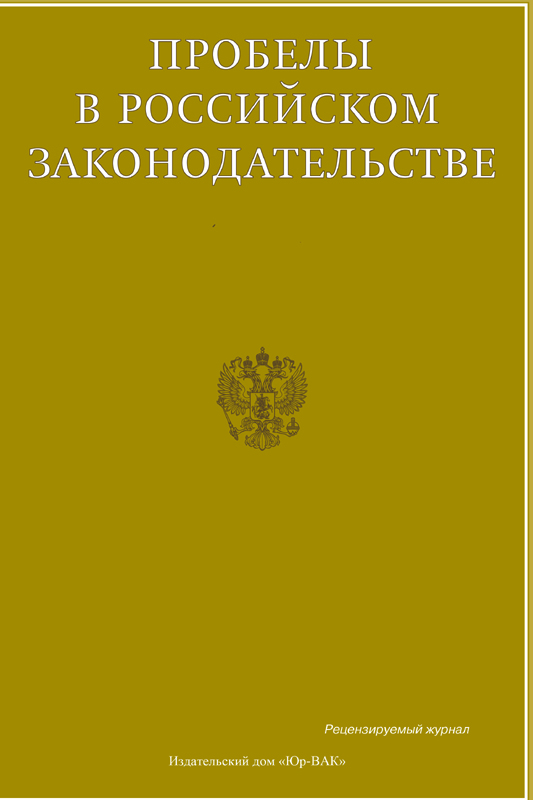Проблемы выявления причин профессиональной преступности
- Авторы: Кравец И.П.1, Бутченко В.Н.1
-
Учреждения:
- Волжский государственный университет водного транспорта
- Выпуск: Том 16, № 1 (2023)
- Страницы: 161-169
- Раздел: Уголовно-правовые науки
- URL: https://journals.eco-vector.com/2072-3164/article/view/569108
- ID: 569108
Цитировать
Аннотация
В статье исследуются причины профессиональной преступности на современном этапе, ее тенденции и закономерности развития, рассмотрены корни, истоки формирования преступного поведения. В целом профессиональную преступность отличает ряд особенностей, относящихся к причинам профессиональной преступности, личности преступника-профессионала, а также к специфике предупреждения профессиональной преступной деятельности. Целью представленного исследования является рассмотрение возникающих в данной сфере вопросов, касающихся выявления причин профессиональной преступности, а также ее рецидивности, где борьба с ней являются важной задачей общества и государства. Значимость этой борьбы определяется особо негативным влиянием рецидивистов и профессиональных преступников на воспроизводство первичной преступности и тем самым на осложнение криминальной ситуации в стране. На основании исследования авторы приходят к выводу, что существенным условием причин профессиональной преступности является и то, что государственные и общественные организации слабо работают над вовлечением освободившихся из мест лишения свободы лиц в здоровую в моральном отношении среду, над изоляцией их от влияния антиобщественных элементов. После отбытия наказания осужденных встречает, как правило, негативное отношение со стороны общества. Без целеустремленной работы с отбывшими наказание лицами невозможно обезопасить их от пагубного общения с профессиональными преступниками, оставшимися на свободе.
Полный текст
Об авторах
Иван Петрович Кравец
Волжский государственный университет водного транспорта
Автор, ответственный за переписку.
Email: kipkn@mail.ru
канд. юрид. наук, заведующий кафедрой государственно-правовых дисциплин
Россия, Нижний НовгородВиктор Николаевич Бутченко
Волжский государственный университет водного транспорта
Email: kipkn@mail.ru
канд. экон. наук, заведующий кафедрой транспортного права
Россия, Нижний НовгородСписок литературы
- Аванесов Г.А. Криминология и социальная профилактика М. 1980. С.210-212.
- Антонян Ю.М., Верещагин В.А., Алманов Г.Б. Тюремная субкультура и нейтрализация ее негативных проявлений / Государство и право. – 1996. - № 10. - С.72.
- Антонян Ю.М. Жестокость в нашей жизни. 1996. С.273.
- Гуров А.И. Профессиональная преступность: прошлое и настоящее. М, 1996. С.247.
- Гуров А.И. Профессиональная преступность и ее предупреждение. Криминология под ред. В.Н. Кудрявцева и В.Е. Эминова, М. 1997. С. 252.
- Кравец И.П., (2022), Проблемы специальных мер предупреждения профессиональной преступности. Пробелы в российском законодательстве, 2: 134-143.
- Криминология / Под ред. Н.Ф. Кузнецовой, Г.М. Миньковского, М.1994. С. 306.
- Крюкова Н.И. Профессиональная преступность в России (источники возникновения, развития и становления) // Мировой судья. 2015. N 4. С. 18 - 23.
- Кузнецова Н.Ф. Проблемы криминологической детерминации М, ИЗД-ВО. Москва. ун-та, 1984. С.44.
- Кудрявцев В.Н. Механизм социальной деформации. Вопросы философии. 1989. №11.
- Кудрявцев В.Н. Причинность в криминологии. М. 1968. С.73.
- Проблемы борьбы с преступностью в современных условиях. Материалы международной научно-практической конференции (24-26 мая 1995) / Отв. ред. : В.П. Кувалдин. – М.: ННиРИО. Москва. Ин-та МВД России, 1996. 180 с.
- Пионтковский А.А. Курс советского уголовного права. Т. 2. М. Наука, 1970. С.81-82.
- Сухарев А.Я., Алексеев А.И., Журавлев М.П. Основы государственной политики борьбы с преступностью. М. Норма, 1997. С.14.
- Федеральный закон от 07.02.2011 N 3-ФЗ (ред. от 21.12.2021) "О полиции" // Собрание законодательства РФ. - 2011. - N 7. - Ст. 900.
- Федеральный закон от 06.04.2011 N 64-ФЗ (ред. от 01.10.2019) "Об административном надзоре за лицами, освобожденными из мест лишения свободы" // Собрание законодательства РФ. - 2011. - N 15. - Ст. 2037.
- Шнайдер Р. Профессиональная преступность и ее предупреждение. М. Юридическая литература, 2006. С. 96.
- Штракс Г.М. Социальное противоречие. М, 1997. С. 12-14.
- Яковлев А.М. Теория криминологии и социальная практика М.1985.
Дополнительные файлы









